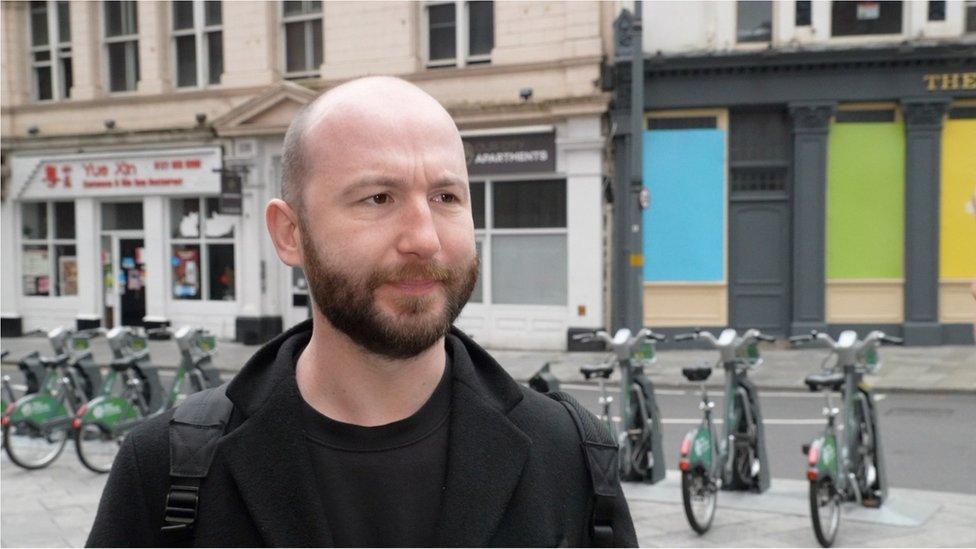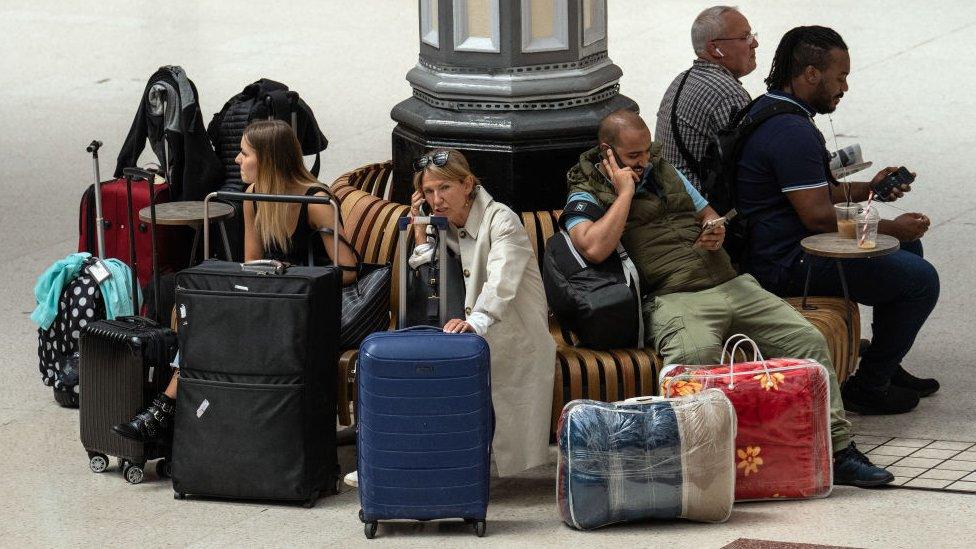Rail strike: My 30-minute journey to work took two hours
- Published
- comments

April Richmond said her 30 minute commute had taken two hours
Rail services in the UK are being disrupted as around 9,000 train drivers in the Aslef union take part in another large-scale strike on Wednesday.
The 24-hour walkout, in a row over pay and conditions, means no trains on lines run by firms such as Northern, Avanti West Coast and Southeastern.
Others are running limited services, while unaffected lines could be busy.
April Richmond says it took two hours to get to work in Birmingham rather than the usual 30 minutes by train.
The Stourbridge resident was also half an hour late.
"I feel like I don't understand enough about why they're striking, but it's definitely making a massive impact, so I hope they get it sorted soon," she told the BBC.

Restaurant co-owner Neil McGougan said repeated strikes were affecting his business, but he supported the strikers
Neil McGougan, who co-owns the Tiger Bites Pig restaurant in Birmingham, said that he expected a slow day of trade but he supported the strike.
"I had to get the bus in instead, so it makes my day longer," he said. "I can moan about it from a business point of view, but I understand why they're doing it," he added.
Some stations are closed, and the rail industry has warned passengers that trains run by unaffected operators will be busy.
Journey planners such as National Rail Enquiries have been updated with the new timetables, detailing how the strike will affect services.
The Associated Society of Locomotive Engineers and Firemen (Aslef) strike is the latest in a series of actions, as unions representing rail workers battle the government and companies over pay, job cuts and changes to terms and conditions.
Only train companies directly involved in the strike will be affected. That differs from RMT union strikes, which also involve Network Rail signallers and therefore cause nationwide disruption.
However, with 13 train companies involved in Wednesday's action, the disruption is extensive.

Affected operators:
Avanti West Coast - no trains running
Chiltern Railways - no trains
CrossCountry - no trains
East Midlands Railway - no trains
Greater Anglia (including Stansted Express) - disruption warning, use alternative services
Great Western Railway - limited service (including Heathrow Express - no trains)
Hull Trains - limited service
LNER - limited service
London Overground - no trains
Northern Trains - no trains
Southeastern - no trains
Transpennine Express - limited service
West Midlands Trains - no trains


Steve Montgomery, chairman of the Rail Delivery Group, which represents industry operators, said he understand the "economic pressures" on workers but called the strikes "unfair" on the public.
He also said the railways needed reform after the pandemic, adding that "modernising practices" would enable rail operators to increase pay.
But Mick Whelan, general secretary of the Aslef union, said drivers had gone without a pay rise for two years and operators should be more generous.
"It seems to me they've got a wish-list of productivity to keep maintaining their ability to make massive profits and give money to their shareholders, yet not want to give it to the people that generate the money by operating the railways."

How have you been affected by the issues in this story? Get in touch.
WhatsApp: +44 7756 165803, external
Tweet: @BBC_HaveYourSay, external
Please read our terms & conditions and privacy policy

Aslef has timed its strike around the Conservative Party Conference in Birmingham, which ends on Wednesday. It also coincides with several football fixtures.
People with tickets for Wednesday can use them on Tuesday, Thursday or Friday, if services are running.
However, there will be no East Midlands Railway (EMR) services on Wednesday, and no services running east of Nottingham up to and including Saturday.
The Transport Salaried Staffs' Association (TSSA) union also has plans for much smaller scale strikes this week, including CrossCountry on 5 October, Great Western Railway on 6-7 October, and Avanti and c2c on Saturday, 8 October.
The National Union of Rail, Maritime and Transport Workers (RMT) will also stage a further national walkout this Saturday.
'Landing zone'
The RMT's general secretary, Mick Lynch, told the BBC that rail worker members of the union will soon be balloted over further strike action, potentially stretching into the spring.
Separately, the Transport Secretary Anne-Marie Trevelyan said her message to trade union leaders was to take their seats at the negotiating table so a "landing zone" could be found that everyone could work with.
Aslef said it was always happy to talk, but there had to be substantive proposals on the table.
On Tuesday, the Transport Secretary also told the Conservative party conference that she had asked the rail industry to launch consultations on reforming ticket office provision.
She insisted it was "not about cutting jobs" but about "putting the passenger at the heart of the railway".
However, Mr Montgomery admitted there would be some cuts to ticket office staff.


Passengers will be wondering how long strikes will last.
If nothing changes, it seems the answer could be for months to come.
The RMT has already said it will re-ballot members for further strike action.
Train drivers' union Aslef has made it clear it doesn't believe an agreement is imminent - despite some progress in talks with the group that speaks for train companies.
Aslef says the train companies involved are imposing real terms pay cuts - that is, wages are failing to keep up with rising prices.
The Rail Delivery Group has insisted neither taxpayers nor passengers can be asked to pay more to plug the financial gap left by the pandemic - so reforms must be agreed to afford pay rises.
The new Transport Secretary Anne-Marie Trevelyan has already taken a different approach to the strikes than her predecessor.
She has met the leaders of the two main rail unions and spoken of all sides needing to make compromises.
The question is whether this will lead to any concrete changes which lead to a breakthrough.

The rail strikes come as thousands of workers across different industries take or consider industrial action as the cost of living soars.
Barristers, postal workers, telecoms workers, teachers, hospital workers, and refuse workers are all holding or planning strikes.
Workers at container ports have also been striking, with congestion at Felixstowe after an eight day walkout, and another strike due in Liverpool.
- Published9 May 2024
